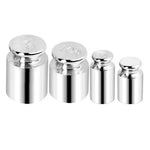What are calibration weights, and why are they important for digital scales?
Calibration weights refer to the calibrated weights that are utilized in the testing of digital scales. Gradually, precision electronic scales can start to lose precision due to extended usage or due to external factors like relative humidity and temperature.
This is the process of using calibration weights so as to re-adjust the scale making it more accurate. This process is highly employed in cases where there is need to be measuring very accurately like in cooking and baking or even in labs.
How often should I calibrate my digital scale?
Calibration depends on how frequently the scale is used and required precision. General kitchen use does not warrant calibration more than once every couple months or when measurement inconsistencies are noticed. If you use that scale every day or it
is used for serious work such as weighing tiny droplets of some ingredients or chemicals, then you may prefer to calibrate the scale more often perhaps monthly or even every other week.
How do I use a calibration weight to calibrate my scale?
To calibrate your digital scale using a calibration weight, follow these steps:
- Turn on your scale and let it warm up for a few minutes.
- Place the scale on a flat, stable surface.
- Enter the calibration mode on your scale (refer to the user manual for specific instructions).
- Place the calibration weight on the center of the scale's platform.
- The scale will display a reading and automatically adjust itself to match the weight.
- Remove the weight and exit calibration mode. Your scale should now be calibrated and ready for use.
What types of calibration weights are available, and which one should I choose?
Calibration weights are unvaried as it comes to being available in different forms and weighs starting with a milligram expanding to maybe a kilogram. The type of calibration weight you need will depend on the maximum load your scale can truck and the
pretentious loads that it is capable of. However, for most, kitchen or everyday use digital scales, load weights between and the galing e covering weight is g common. Inaccurate or scales designed for conventional scientific use uses heavier weights
in grams hence are revised with how many ounces are in one pound vise versa. As a rule of thumb, it is highly advisable that such a weight should measure directly or very nearly measure the load readings of the scale.
Can I use any object as a calibration weight?
This is not a good practice as there can be differences in the mass which can interfere with the correct calibration. These devices have been made for the purpose of calibration to a very high level of accuracy and hence are designed to hold only the
mass required for that use. If for example one decides to use coins or any other items around the house, then there is a very high chance of miscalibration and the scale will be faulty.
What is the difference between different classes of calibration weights?
In order to make sure that every calibration weight serves its requirement there are different classes within them. In common usage, there are E1, E2, F1, F2 classes, starting with the E1 class which has the highest precision and the strictest tolerance.
For kitchen or general purpose use, F2 class weights tend to be enough. While for E1 or E2 class weights include higher accuracy and are for more precision loads such as for laboratory, scientific work.
Do I need to calibrate my scale after changing its location?
Indeed, it is considered the best practice to recalibrate your scale after it has been relocated. Surface stability, temperature, and humidity increases where the weight scale is positioned can impair the performance of the scale. Thus, letting them adapt
to the new surroundings and extend the lifetime of accurate measurements.
Can environmental factors affect the accuracy of calibration weights?
As accurate as calibration weights may be, there are environmental extremes such as temperature changes, humidity, and dust which may over extended periods of time compromise their measurement accuracy. It is best that calibration weights should be used
in a clean and dry area and should also be handled properly to avoid distortion.
How do I maintain and store my calibration weights?
To ensure the calibration weights remain true, put the weights in a proper case or container to avoid soiling or misuse. Turn it over when handling them to minimize contamination. This may cause oils and dirt to accumulate pity. Therefore during use,
you should put on gloves or use tweezers to hold them. Also, doing infrequent maintenance cleaning of wiping the outmost part of the weights with a clean cloth will also protect their accuracy.
Where can I purchase high-quality calibration weights?
Insomnia’s Smoke offers several options of the quality calibration weights. Our collection comprises weights that are appropriate for different scales whether they are for the kitchen, laboratory or any other precision work. To search through our collection
visit our online store for your calibrated digital scales weight needs.



